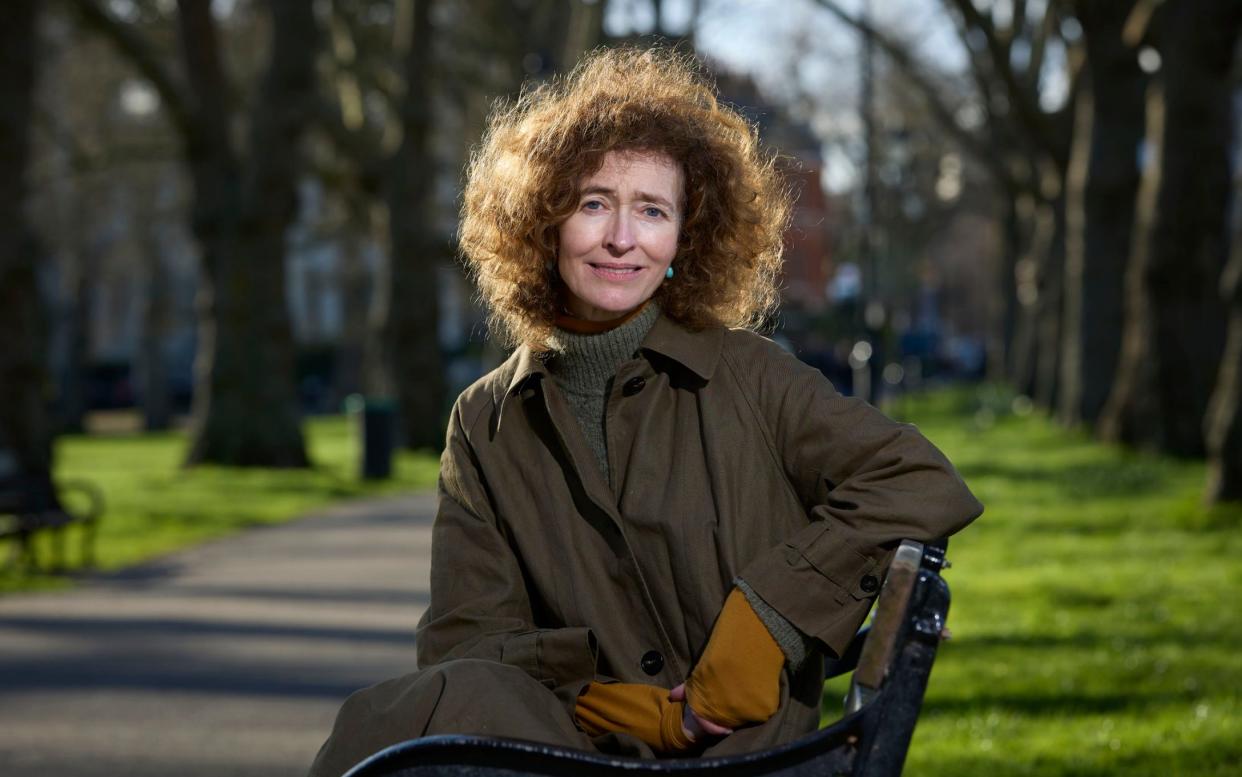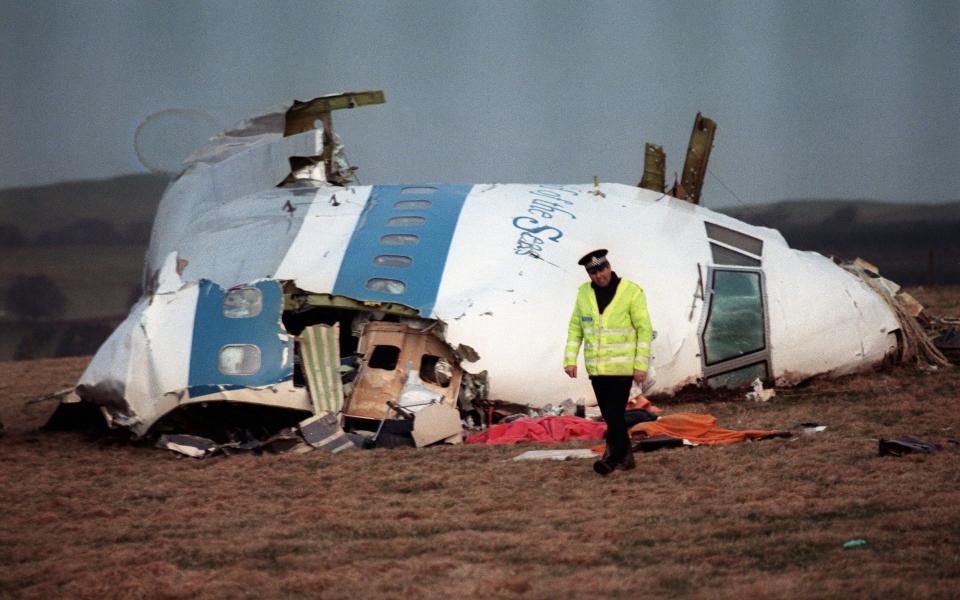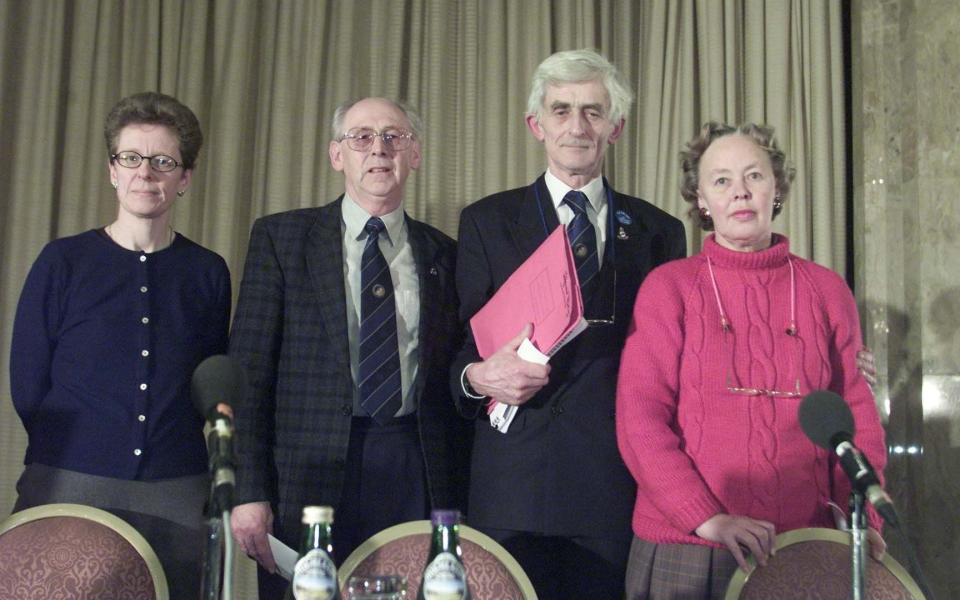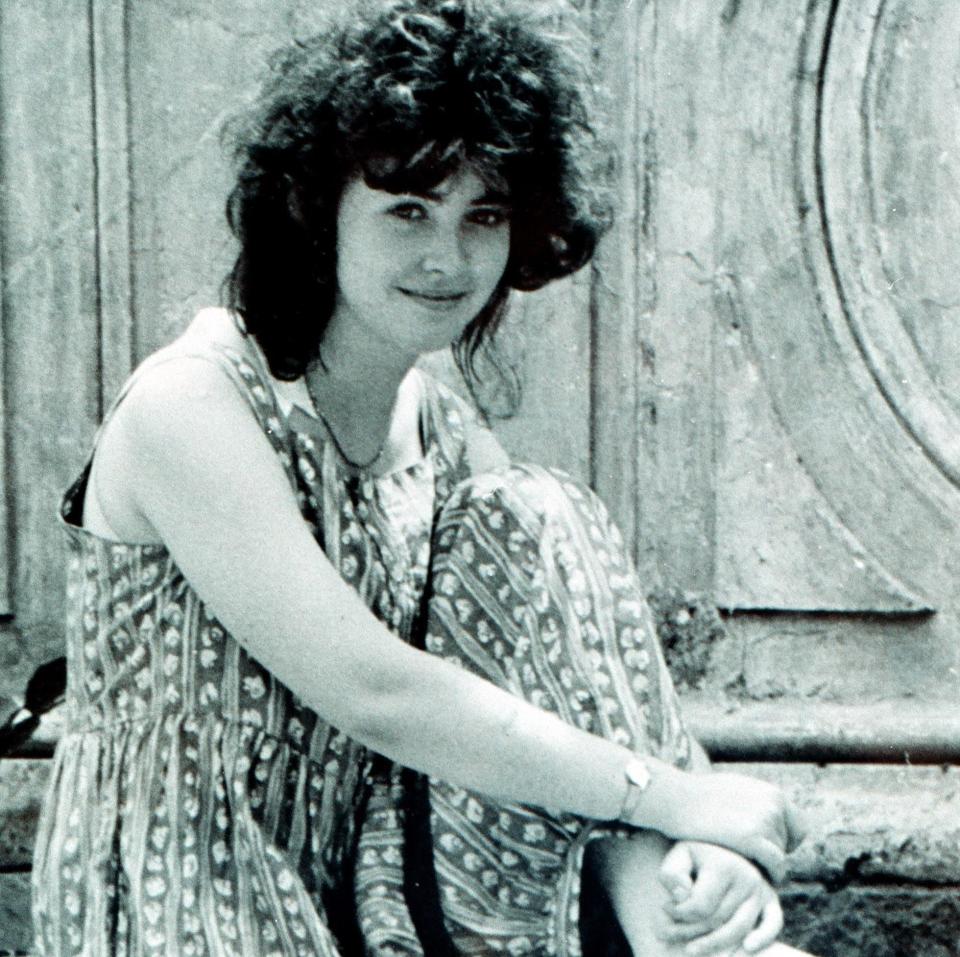‘I felt silenced by my father seeking justice after my sister was killed in the Lockerbie bombing’

- Oops!Something went wrong.Please try again later.
Where some might struggle for inspiration, Catherine Swire has always found it in one place: chickens.
Having turned to rearing birds after her sister, Flora, was killed in the 1988 Lockerbie bombing, they have served as a symbol of her grief, a practical distraction, and source material for her work as a poet – one of few tangible things in the decades of “dislocation” that the past 35 years have wrought.
It was the day before Flora’s 24th birthday, and two days before Swire’s own 21st, when the girls headed to Heathrow, where the elder would board Pan Am Flight 103 to New York to spend Christmas with her boyfriend.
A bomb was stored in a suitcase in the hold, beneath Flora’s feet at her seat on the flight deck above, where it would detonate 38 minutes after take-off. All 259 passengers and crew were killed, along with 11 residents of the Scottish town on which sections of the aircraft fell.
There would be no period of private mourning for Swire, for whom the agony of her sister’s death was immediately compounded by competing political regimes, frenzied global fascination, and endless news crews filling the drive of her parents’ home.
She saw the period as “almost in Hiroshima or Nagasaki terms, personally”. The bomb, and Flora’s death, “had blown my family apart”.

Swire writes of her attempt to pick her way through tragedy in her literary memoir, Flame, Ash, Feather: A dozen eggs from Lockerbie. It marks the first time she has felt able to voice publicly the bombing’s toll, as Lockerbie’s grim aftermath has been mostly kept in the news via Dr Jim Swire, the father of the young women (and their younger brother, William).
Dr Swire has long maintained that the only man ever to be convicted of the attack – Libyan national Abdelbaset al-Megrahi, with whom he forged a relationship and visited on his deathbed – was not the culprit. This public drum-banging, while lauded by many, has also caused fissures between some of the victims’ families – including his own.
The Swire children were raised in Gloucestershire, primarily by their mother, Jane, while Dr Swire worked as a GP (a role he left after Flora’s death). Her father navigating such a public path through grief meant that, “from the beginning and increasingly, I have felt silenced, helpless”, Swire reflects today.
She recalls on one occasion raising her discomfort with his campaign, to which “my father immediately said, ‘Well, I can see I’m not appreciated here!’ Or something similar, jumped in his car and drove off – for a long time; we thought he’d left. This and many other extreme actions,” she says, “made any straightforward, honest, or heartfelt conversation about the constant courting of the cameras seem impossible.”

She and Flora had served as confidantes for one another, their bond forming fast over the uneasy state of their parents’ marriage during their childhood, which seemed to them “full of suffering”.
Yet post-Lockerbie, that relationship was publicly revised: they became the perfect symbol of the nuclear family, which “made the agony of loss and the process of mourning harder because of the lack of continuity. It left me feeling more isolated,” Swire says. Her parents are now in their 80s; she remains close to her mother, though her relationship with her father is “very quiet” as a result of what has passed. The epilogue of the book is partly in Jane’s words, where she notes that “putting emotions into print tends to give our constantly variable and changeable feelings the sort of permanence they do not always deserve”.
The collapse of her family life ran so deep as to become “cellular”, where her brother was concerned – a tumour began growing on his brain around that time, while a few years later, she developed a blood clot. Those problems have persisted over the years; he is “OK at the moment”, Swire says, and she is too, “though I still can’t read for sustained periods”.
Flame, Ash, Feather – or, as Swire calls it, “the chicken book” – is a collection of bird poems and anecdotes, interspersed with a scattering of reflections on Lockerbie that she hopes will address events without the “violence” that coverage until now has yielded.
It charts how, in her second year reading English at Oxford, the combination of trauma from losing her sister and the volume of her father’s search for justice saw her own voice vanish completely. “Initially I struggled to speak except by listening to what others were saying and sort of mirroring it back,” she says. She recognises now that it was “an extreme form of disassociation – and identity loss”.
The matter felt “too big” to be resolved in therapy. So, consigned to a world of silence, she leant on friends and tutors for support after the loss of Flora, thinking of whom leads to waves of tears during our conversation. But she learnt along the way that there is a “very bizarre energy and excitement around a global event, which is very, very difficult if you’re emotionally connected with it. What made recovery from Lockerbie so difficult is that there was quite a forcefield of attention around it, because it was exciting.” A university housemate used that very word to describe Swire’s father appearing on the Nine O’Clock News; her then-boyfriend would end up making his name with a novel in which he “roll[ed] parts of the story away to his own artistic ends”.
Flora, who had been “a stronger character than me, more outspoken, and very strong. Very, very strong,” might have handled things differently. She, meanwhile, “felt passive, helpless in the face of these ethically despicable thefts”. Swire eventually found comfort in reading poetry, “to hook my traumatised mind back”, and in chickens, who “give continuity where explosions give none”. She adds that “one of the biggest shocks of somebody dying very suddenly is you have no reference, at all. And so I think the act of looking at chickens really did map that.”

Swire skipped between jobs (including as a receptionist at one company, which hired her for having a quiet voice, “head of knowledge” for a corporate firm, and roles in volunteer support groups and charities), writing in between raising her two children, now 20 and 21. Her voicelessness persisted, throughout her marriage to a man “who, though not violent, found other subtler ways to control” – running up debts on Swire’s credit card, which he would persuade her to pay off. At times, she could not afford to feed their family; he was good, she thinks, “at spotting potential vulnerability”, which she had in abundance. The marriage ultimately ended a decade-and-a-half ago in what Swire describes as “a game of ‘chicken’”. He threatened her with a gagging order, or suing her for half of the family home in the Malvern Hills. She didn’t yield; neither materialised.
In early 2020, having gone through the sensation of “falling awake”, Swire began writing about her life post-Lockerbie. In some ways, it was a practical exercise: her desire to see, on paper, what she had achieved over the years. “If I’m completely honest, I felt quite a burden of expectation, which I’d utterly failed to meet.”
Following in a literary tradition of pastoral writing in times of global crisis (our interview is peppered with references to Virgil and Socrates, Julian of Norwich, Christine de Pizan and more), she finished her book in 2020, and shut it away in her home (where she lives with her partner of eight years, a medical writer, and their “ancient” dog). Then in 2022, while working part-time as an English teacher at Worcester Sixth Form College, she entered and won the “Bottom Drawer Prize”, run by Black Spring Press. Her family read it ahead of publication.
Redrawing the event that has defined her life, on her own terms, is all the more stark given the timing. A new blockbuster series from the BBC and Netflix is in the works; and another from Sky, based on Dr Swire’s 2021 book, is currently being filmed, with Colin Firth playing her father. That adaptation will also feature Flora Swire as a character, a decision about which she says she wrote to the producers and “begged” them to take her out: “I was given no choice. Given the choice, I would have said no.”
She does not want Flora to die for the millionth time, as she has in so many docu-dramas over the past three-and-a-half decades, which “has very profound consequences”, Swire says. “There is a reason for burial, and for mourning; there is a process to death.” A process first disrupted by the terrorists who orchestrated the attack, then by those who she sees as raking over what could be consigned to history.
That’s not to say that her mind doesn’t drift back to the children her sister hoped for (“she would have a family, definitely, and I feel we would be very integrated”), to the fact her own are the age she was when Flora died (Swire sees much of her sister in her “feisty” daughter). Thinking back is not always a salve, though, particularly when considering the “blood money” offered to families by the Libyan government following al-Megrahi’s 2001 conviction.
Swire “very much” considered not taking it, and admits “I still think about that, and what the right way” to navigate such a gruesome moral dilemma might have been. In the end, with her children in mind, she used the money to buy their home – but no amount given could ever appropriately compensate for such a loss, she adds. “Making the equation between life and money is never going to work. It’s no equation at all.”
For her there is no great justice that could be served now, where Lockerbie is concerned: no conviction or admission (including the May trial of one of the alleged bombers) that would change the seismic impact on the lives of all those involved. “The most important part to me is Flora, and she’s dead. And I feel that the continuing, extremely loud discourse about political events is neither the friend of peace, nor of emotional recovery.”
On the latter, though it took decades, she can feel her sister’s presence “very strongly” now. The shift has been welcome, she says. “It’s taken me 35 years, probably, to get to a position even to look at you and say, ‘I feel like Flora’s here.’”
‘Flame, Ash, Feather: A dozen eggs from Lockerbie’ is published by The Black Spring Press Group, £20

